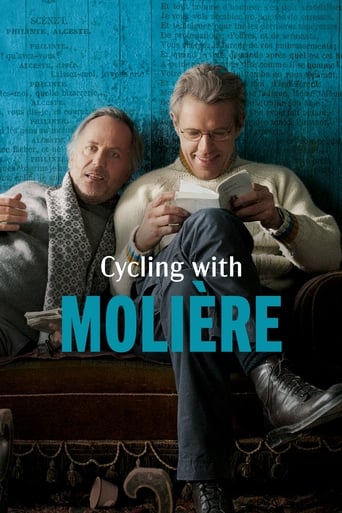Matrixston
Wow! Such a good movie.
NekoHomey
Purely Joyful Movie!
Pacionsbo
Absolutely Fantastic
Fairaher
The film makes a home in your brain and the only cure is to see it again.
don2507
A popular TV actor with presumed artistic aspirations, the character of Gauthier Valence, travels to an island off the west coast of France to solicit a former acting companion, the reclusive, ill-tempered character of Serge Tanneur, to join him in a stage production of Moliere's The Misanthrope. Tanneur is retired, and says he hates acting and actors, but eventually agrees to at least rehearse with Valence for four days. Based on a daily coin flip, they will alternate the roles of Alceste (the "Misanthrope" who detests the hypocrisies of social life and rebukes men's dishonesty toward each other) and Philinte (who argues for a necessary role in social life of courtesies and half-truths). One might simplify things by labeling Alceste as the idealist and Philinte as the realist. At the end of the brief rehearsals Tanneur will decide whether he will participate in the production, and if he does the two actors have agreed (are they companions? rivals?) to rotate the parts on a daily basis.To me, the fascinating part of this film was how the two characters submerged / transformed their interaction and emerging rivalry into the two characters of Moliere's play and the echoed interaction of the play's characters onto their own relationship. As they rehearsed, it seemed like Moliere's lines were reflecting aspects of their own interrelationship, which to me was clever screen writing. We also see during these stimulating two-person readings, a subtle evolution of their acting relationship from one of apparent agreement and collaboration to one of ego tests and indirect humiliations. Does the play come off? I believe you can enjoy this film without being familiar with The Misanthrope. I hadn't seen it performed in 30 years, and yet I could appreciate the juxtaposition of Moliere's play and the interaction of these two actors.
Bob Taylor
I've enjoyed Philippe Le Guay's films very much, and love the way he uses Fabrice Luchini, that wonderful French everyman actor. Luchini has played classical roles before (Moliere), and here he sinks delightfully into the part of a washed-up actor who's retired to a run-down house on a damp, hard to reach island off the French coast. A big TV star (Lambert Wilson) arrives with an offer to put on a production of Le misanthrope, the juiciest starring role in French drama. How can he refuse such a part? The script allows the actors to reach into the recesses of their experience in theater, and gives us lots of lore. Luchini even quotes Louis Jouvet on speaking alexandrines: the idea that one can skip a foot in a line and get away with it, it's like ordering 1000 grams of something at the store and getting only 800--a fraud. Maya Sansa contributes a supporting role of an unhappy divorcée; I hadn't seen her before but she is impressive.
Red-125
The French film "Alceste à bicyclette" was shown in the U.S. with the title "Bicycling with Molière" (2013). It was directed by Philippe Le Guay, and co-written ("from an original idea") by Le Guay and one of the stars, Fabrice Luchini.I'm sure the title was changed in translation because the producers reasoned--correctly, in my case--that U.S. viewers wouldn't recognize that Alceste is a character in "The Misanthrope," a play by Moliere. (Not that Moliere is a household word in the U.S. either, but it's more recognizable than Alceste.)The basic plot of the movie is set out within the first few minutes. Fabrice Luchini plays Serge Tanneur, a retired actor who now lives alone in a crumbling house near the ocean. Lambert Wilson is Gauthier Valence, also considered an excellent actor, but now being defined by his role as a neurosurgeon in a French television series. He's truly famous--recognized by everyone, and pictured on the cover of magazines.Gauthier has enough money to produce Moliere's "The Misanthrope," on the Paris stage. He wants to play the misanthrope, and he knows that the play will succeed if he can get Serge to play opposite him.Serge protests that he really is retired, doesn't want to do it, but . . . maybe. He convinces Gauthier to stay in the local hotel for a few days while they read the play together. Then he'll decide. Everything else follows from those opening scenes.I've seen "The Misanthrope" on stage, and it is truly a great play. Of course, those of us that don't speak French are really at a disadvantage. That's because the play is written in rhymed couplets, so the prose translations are just a pale reflection of what Moliere created. Incidentally, Moliere didn't write in iambic pentameter the way Shakespeare did. He wrote in Alexandrines, which have 12 syllables rather than 10. This is important in the film, because at one point Serge tells Gauthier that he has to pronounce a word with two syllables rather than one, in order to maintain Moliere's "music." Gauthier replies that as long as the line is communicated, the number of syllables doesn't make any difference. Just one of many artistic disagreements between the two men. Both Luchini and Valence are such great actors that they can make us understand how two people--even friends who are truly dedicated to the theater--can still rub each other raw.The situation is tense enough, and gets more tense when Serge says that he wants to play Alceste. They finally agree to alternate roles.Things get more complicated with the appearance of Francesca, played by Maya Sansa. She's an Italian woman, living in France after her divorce. There appears to be a certain chemistry between Francesca and Serge, although it's subtle.At one point, the three characters go for a bicycle ride along the coastline. It's a beautiful scene, clearly meant as an homage to Truffaut's "Jules and Jim."I thought this was a great movie in many ways. The acting was superb. There's an obvious parallel between Serge as a misanthropic actor who would be typecast as the misanthrope in Moliere's play. The scenes when the two talented actors are rehearsing Moliere are brilliant.We saw this film on the large screen, where it probably works better than it will on DVD. However, if you have to see it on the small screen, that's OK. For inexplicable--to me-- reasons, the film carries only a 6.7 rating on IMDb. Don't believe it. It's much, much better than that.
richard-1787
This is a first-rate movie. I've seen it four or five times by now - I am using it in a class - and each time I watch it, I marvel anew at the talent of the two lead actors, two stars of today's French cinema, Lambert Wilson and Fabrice Lucchini, and the quality of the script.One could summarize it by saying that it is the story of two actors who rehearse for a touring production of Molière's masterpiece, The Misanthrope. One, Serge, played by Lucchini, has become bitter in his lonely retirement. The other, Gauthier, is a financial and romantic success, but wants to accomplish something worthy of his artistic merits as well. In the course of rehearsing the play, both find that the words Molière gave to his misanthropic protagonist, Alceste, allow them to express their own growing hatred of the world around them.If you don't know the play, I don't know how much of an effect this movie will make. Since the play is one of the classics of French theater, the director and producer could assume that many in their French audience would remember the play from their school days, the way at least some Americans are able to remember something about Hamlet from high school, and so understand what the two male leads are doing. If, because you don't know Molière's play, you can't do that, I don't know what you will get out of this very fine film.

